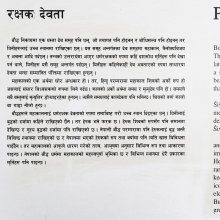Samuha, Samūha: 22 definitions
Introduction:
Samuha means something in Hinduism, Sanskrit, Jainism, Prakrit, Buddhism, Pali, the history of ancient India, Marathi, Hindi. If you want to know the exact meaning, history, etymology or English translation of this term then check out the descriptions on this page. Add your comment or reference to a book if you want to contribute to this summary article.
Samuha has 21 English definitions available.
Images (photo gallery)
Languages of India and abroad
Sanskrit dictionary
[Deutsch Wörterbuch]
Source: Cologne Digital Sanskrit Dictionaries: Böhtlingk and Roth Grosses Petersburger WörterbuchSamūha (समूह):—(von 1. ūh mit sam) m.
1) Anhäufung [Atharvavedasaṃhitā 3, 24, 7.] Haufe, Schaar, Menge, Aggregat [Amarakoṣa 2, 5, 39.] [Hemacandra’s Abhidhānacintāmaṇi 1411.] [Halāyudha 4, 1.] yakṣarakṣasām [Mahābhārata 3, 15640.] āhūteṣu (so ed. Bomb.) samūheṣu tava sainyasya mānada . nābhūlloke samaḥ kaścitsamūha iti me matiḥ .. [7, 4977. fg.] deva [Harivaṃśa 4330.] jñātīnām [Amarakoṣa 2, 6, 1, 35.] [Halāyudha 2, 336.] [Varāhamihira’s Bṛhajjātaka S. 53, 31.] [Rājataraṅgiṇī 1, 112.] [Pañcatantra 222, 7.] go [Mārkāṇḍeyapurāṇa 49, 50.] [Rājataraṅgiṇī 4, 172.] śalabha [Śākuntala 31.] pādapānām [Rāmāyaṇa 3, 17, 6. 12.] [PAÑCAR. 1, 7, 20.] suśikhā (schönes Haar) [Bhāgavatapurāṇa 3, 20, 36.] ratna [Vetālapañcaviṃśati] in [Lassen’s Anthologie (III) 2, 19.] tuṣa [Varāhamihira’s Bṛhajjātaka S. 53, 62.] śāstra [PAÑCAR. 4, 2, 4.] [Oxforder Handschriften 53], b, [37. fg.] dravya [Suśruta 1, 5, 14. 14, 1.] roga [249, 15.] vāksamūha [2, 266, 14.] vākyaṃ padasamūhaḥ [TARKAS. 49.] pada so v. a. padapāṭha [Prātiśākhya zur Vājasaneyisaṃhitā 4, 174.] paramāṇūnām [Bhāgavatapurāṇa 5, 12, 9.] [Sāhityadarpana 52.] [SARVADARŚANAS. 142, 12. 15. fgg.] [Vedānta lecture No. 20.] [Prātiśākhya zur Vājasaneyisaṃhitā 1, 15.] mahāvāta so v. a. Sturmwind [Mahābhārata 7, 89.] —
2) = gaṇa eine zur Verfolgung bestimmter Zwecke zusammengetretene Anzahl von Menschen, Verein, Körperschaft [Manu’s Gesetzbuch 8, 221.] [Yājñavalkya’s Gesetzbuch 2, 188. fg.] —
3) Summe, Inbegriff: sarvaśrutisamūho yaṃ śrotavyo dharmabuddhibhiḥ [Mahābhārata 1, 2316.] —
4) Nomen proprium eines göttlichen Wesens (wenn pārṣṇikṣemaḥ sa gelesen wird) [Mahābhārata 13, 4355.] — Vgl. kāma, bha, vana, sāmūhika .
Sanskrit, also spelled संस्कृतम् (saṃskṛtam), is an ancient language of India commonly seen as the grandmother of the Indo-European language family (even English!). Closely allied with Prakrit and Pali, Sanskrit is more exhaustive in both grammar and terms and has the most extensive collection of literature in the world, greatly surpassing its sister-languages Greek and Latin.
See also (Relevant definitions)
Starts with (+2): Samuha-gana, Samuha-gita, Samuha-nritya, Samuhagandha, Samuhaka, Samuhakarya, Samuhakaryya, Samuhaksharaka, Samuhalakshita, Samuham, Samuhamadhyama, Samuhana, Samuhanati, Samuhani, Samuhasanni, Samuhashila, Samuhat, Samuhata, Samuhatatta, Samuhati.
Ends with (+12): Ajnanasamuha, Asthisamuha, Balasamuha, Bhasamuha, Bhitri-samuha, Carmasamuha, Dayadasamuha, Diksamuha, Dravyasamuha, Dvipasamuha, Ekarthavachinnasutrasamuha, Jatisamuha, Jvalasamuha, Kamasamuha, Kitasamuha, Kriyasamuha, Mahavatasamuha, Matadatasamuha, Nimna-samajika-arthika-samuha, Padarthasamuha.
Full-text (+109): Samuhakarya, Shastrasamuha, Vanasamuha, Samuhika, Yaugavaratra, Potya, Samuham, Samuhaksharaka, Samuhagandha, Samuh, Samuhaka, Samuhani, Vaishaya, Carmina, Carmana, Saira, Samuhana, Vyapoha, Samuhin, Samoha.
Relevant text
Search found 36 books and stories containing Samuha, Sam-uha, Sam-ūha, Sam-ūhā, Samūha, Samūhā; (plurals include: Samuhas, uhas, ūhas, ūhās, Samūhas, Samūhās). You can also click to the full overview containing English textual excerpts. Below are direct links for the most relevant articles:
Garga Samhita (English) (by Danavir Goswami)
Verse 4.2.6 < [Chapter 2 - The Story of the Gopīs That Had Been Sages]
Verse 2.9.22 < [Chapter 9 - Brahmā’s Prayers]
Verse 3.7.15 < [Chapter 7 - The Holy Places of Śrī Girirāja]
Tattvartha Sutra (with commentary) (by Vijay K. Jain)
Verse 3.21 - The direction of the first of each pair of rivers < [Chapter 3 - The Lower World and the Middle World]
Verse 4.1 - The four kinds of celestial beings (deva) < [Chapter 4 - The Celestial Beings]
Sahitya-kaumudi by Baladeva Vidyabhushana (by Gaurapada Dāsa)
Text 4.85 < [Chapter 4 - First-rate Poetry]
Ishavasya Upanishad with Shankara Bhashya (Sitarama) (by S. Sitarama Sastri)
Vakyapadiya of Bhartrihari (by K. A. Subramania Iyer)
Verse 1.16-17 < [Book 1 - Brahma-kāṇḍa (or Āgama-samuccaya)]
Verse 3.8.48 < [Book 3 - Pada-kāṇḍa (8): Kriyā-samuddeśa (On Action)]
Verse 3.8.4 < [Book 3 - Pada-kāṇḍa (8): Kriyā-samuddeśa (On Action)]
Yajnavalkya-smriti (Vyavaharadhyaya)—Critical study (by Kalita Nabanita)
Chapter 4.3 - Special Adjudicatory Machinery < [Chapter 4 - The Political Aspect Reflected in the Vyavahārādhyāya]
Chapter 4.7 - Existence of the Autonomous Bodies or Groups < [Chapter 4 - The Political Aspect Reflected in the Vyavahārādhyāya]

